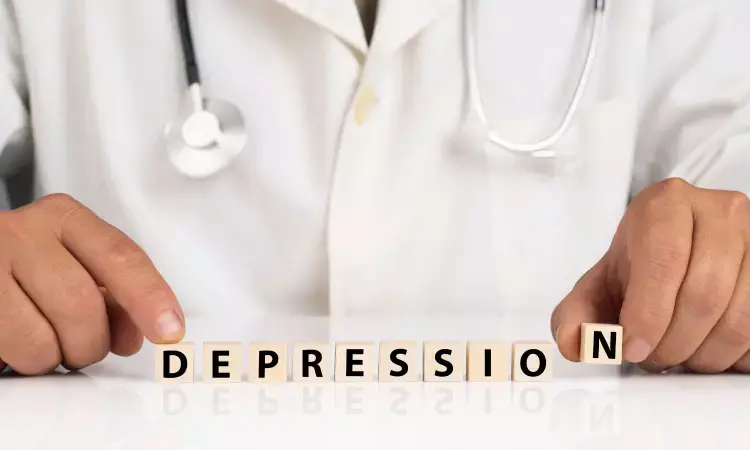- Home
- Medical news & Guidelines
- Anesthesiology
- Cardiology and CTVS
- Critical Care
- Dentistry
- Dermatology
- Diabetes and Endocrinology
- ENT
- Gastroenterology
- Medicine
- Nephrology
- Neurology
- Obstretics-Gynaecology
- Oncology
- Ophthalmology
- Orthopaedics
- Pediatrics-Neonatology
- Psychiatry
- Pulmonology
- Radiology
- Surgery
- Urology
- Laboratory Medicine
- Diet
- Nursing
- Paramedical
- Physiotherapy
- Health news
- Fact Check
- Bone Health Fact Check
- Brain Health Fact Check
- Cancer Related Fact Check
- Child Care Fact Check
- Dental and oral health fact check
- Diabetes and metabolic health fact check
- Diet and Nutrition Fact Check
- Eye and ENT Care Fact Check
- Fitness fact check
- Gut health fact check
- Heart health fact check
- Kidney health fact check
- Medical education fact check
- Men's health fact check
- Respiratory fact check
- Skin and hair care fact check
- Vaccine and Immunization fact check
- Women's health fact check
- AYUSH
- State News
- Andaman and Nicobar Islands
- Andhra Pradesh
- Arunachal Pradesh
- Assam
- Bihar
- Chandigarh
- Chattisgarh
- Dadra and Nagar Haveli
- Daman and Diu
- Delhi
- Goa
- Gujarat
- Haryana
- Himachal Pradesh
- Jammu & Kashmir
- Jharkhand
- Karnataka
- Kerala
- Ladakh
- Lakshadweep
- Madhya Pradesh
- Maharashtra
- Manipur
- Meghalaya
- Mizoram
- Nagaland
- Odisha
- Puducherry
- Punjab
- Rajasthan
- Sikkim
- Tamil Nadu
- Telangana
- Tripura
- Uttar Pradesh
- Uttrakhand
- West Bengal
- Medical Education
- Industry
Are Probiotics useful as adjuvant therapy for people with depression?

UK: Recent years have brought to the attention that probiotics have gained popularity as a potential treatment for the treatment of clinical psychiatric disorders by targeting the gut microbiota.
In the past, the evidence on the efficacy of probiotics in depression has been limited. This updated review and meta-analysis identified the gap and analysed all the recent trials based on the current RCTs published in the Journal of Clinical Medicine.
A randomised controlled clinical trial analysis involving 404 participants with depression aims to evaluate the efficacy of probiotics in reducing depressive symptoms among people with clinical depression, comparing their effectiveness as adjunctive therapy versus stand-alone treatment.
The review offered stronger evidence to support the clinical use of probiotics in depressed populations and provided insight into the mode of administration more likely to yield antidepressant effects.
The key findings of this study are:
- The meta-analysis of seven studies demonstrated that probiotics effectively reduced depressive symptoms when used alongside antidepressant medication (SMD = 0.83, 95% CI 0.49–1.17).
- When administered as a stand-alone treatment, probiotics did not yield significant benefits (SMD = -0.02, 95% CI -0.34–0.30).
These results of these findings provide more substantial evidence supporting the use of probiotics as adjunctive therapy for depressed populations, shedding light on the most effective mode of administration and emphasising the importance of incorporating probiotics alongside antidepressant medication. Healthcare professionals may enhance treatment outcomes and improve the well-being of their patients.
By leveraging probiotics potential, healthcare providers can enhance their treatment strategies for individuals with depression.
In conclusion, as this review included a small number of studies, it is noted that further research is needed to understand these mechanisms and their impact on depressive symptoms fully. The potential mechanisms of action, like modulation of brain-derived neurotrophic factor (BDNF) and C-reactive protein (CRP), also required further research.
“Future research should further investigate the mechanisms of action and explore optimal dosage and treatment duration “, the author added.
Reference;
Nikolova, V.L.; Cleare, A.J.; Young, A.H.; Stone, J.M. Updated Review and Meta-Analysis of Probiotics for the Treatment of Clinical Depression: Adjunctive vs. Stand-Alone Treatment. J. Clin. Med. 2021, 10, 647.
Dr. Chumbeni E Lotha has completed her Bachelor of Pharmacy from RIPANS, Mizoram and Doctor of Pharmacy from SGRRU,Dehradun. She can be reached at editorial@medicaldialogues.in
Dr Kamal Kant Kohli-MBBS, DTCD- a chest specialist with more than 30 years of practice and a flair for writing clinical articles, Dr Kamal Kant Kohli joined Medical Dialogues as a Chief Editor of Medical News. Besides writing articles, as an editor, he proofreads and verifies all the medical content published on Medical Dialogues including those coming from journals, studies,medical conferences,guidelines etc. Email: drkohli@medicaldialogues.in. Contact no. 011-43720751


